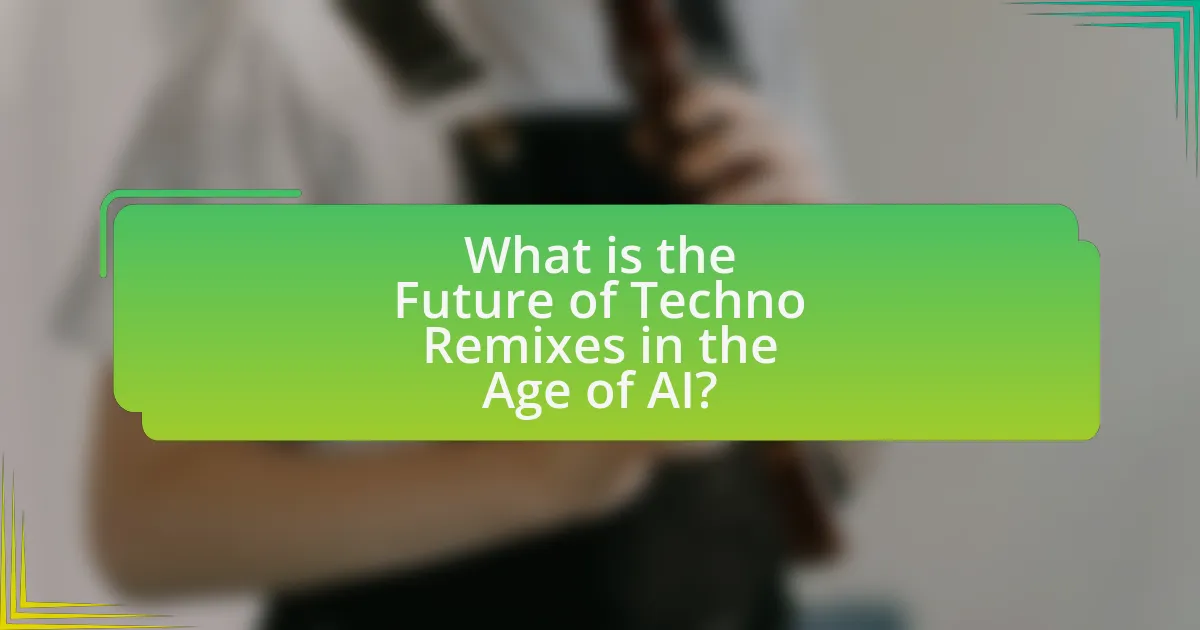The article examines the future of techno remixes in the context of artificial intelligence (AI), highlighting how AI technologies are transforming music production by enhancing accessibility and fostering innovation. It discusses the role of AI in automating sound selection, improving audio quality, and enabling real-time collaboration, while also addressing the tools and technologies used in AI-driven remixing. The implications of AI on the techno music industry, including challenges related to originality, copyright, and the evolving roles of DJs and producers, are explored. Additionally, the article outlines opportunities for emerging artists and the ethical considerations surrounding AI-generated music, ultimately predicting trends and best practices for integrating AI into techno remixes.

What is the Future of Techno Remixes in the Age of AI?
The future of techno remixes in the age of AI is characterized by increased accessibility and innovation in music production. AI technologies enable artists to create complex remixes more efficiently, utilizing algorithms that analyze existing tracks and generate new variations. For instance, AI tools like OpenAI’s MuseNet and Google’s Magenta allow musicians to experiment with different styles and sounds, leading to unique remix possibilities. This technological advancement not only democratizes music production but also fosters collaboration between human creativity and machine learning, resulting in a diverse range of techno remixes that push the boundaries of the genre.
How is AI transforming the creation of techno remixes?
AI is transforming the creation of techno remixes by automating sound selection, enhancing audio quality, and enabling real-time collaboration. Advanced algorithms analyze existing tracks to identify key elements such as tempo, rhythm, and melody, allowing producers to generate unique remixes quickly. For instance, AI tools like LANDR and AIVA utilize machine learning to suggest samples and effects tailored to specific genres, including techno. This technology not only streamlines the remixing process but also democratizes music production, making it accessible to a broader range of creators. The integration of AI in music production has been shown to increase efficiency, with studies indicating that AI-assisted tools can reduce the time spent on mixing by up to 50%.
What tools and technologies are being used in AI-driven remixing?
AI-driven remixing utilizes tools and technologies such as machine learning algorithms, digital audio workstations (DAWs), and generative adversarial networks (GANs). Machine learning algorithms analyze existing music to identify patterns and styles, enabling the creation of new remixes that maintain the essence of the original tracks. Digital audio workstations like Ableton Live and FL Studio provide the necessary environment for producers to manipulate audio and integrate AI-generated elements seamlessly. Generative adversarial networks, which consist of two neural networks competing against each other, can generate unique musical compositions and variations, enhancing the creative process in remixing. These technologies collectively enable artists to innovate and explore new sonic landscapes in techno music.
How does AI influence the sound design in techno remixes?
AI significantly influences sound design in techno remixes by enabling innovative sound manipulation and generation techniques. Through machine learning algorithms, AI can analyze vast amounts of audio data to identify patterns and styles, allowing producers to create unique sounds that blend traditional techno elements with novel audio textures. For instance, AI tools like OpenAI’s MuseNet and Google’s Magenta can generate new musical compositions and soundscapes, enhancing creativity in remixing. Additionally, AI-driven software can automate mixing and mastering processes, improving efficiency and precision in sound design. This integration of AI not only streamlines production but also expands the sonic possibilities available to artists, leading to a more diverse and experimental techno landscape.
What are the implications of AI on the techno music industry?
AI significantly impacts the techno music industry by enhancing music production, enabling personalized experiences, and facilitating innovative sound design. The integration of AI tools allows producers to automate repetitive tasks, analyze vast datasets for trends, and generate unique sounds, which can lead to more efficient workflows and creative possibilities. For instance, AI algorithms can analyze listener preferences and suggest tailored playlists, thereby improving audience engagement. Additionally, AI-driven software like AIVA and Amper Music has been used to compose original tracks, showcasing the potential for collaboration between human artists and AI systems. This technological advancement not only democratizes music creation but also raises questions about authorship and the future role of human creativity in music production.
How does AI affect the role of traditional DJs and producers?
AI significantly alters the role of traditional DJs and producers by automating music creation and enhancing live performances. This technology enables DJs to utilize AI-driven tools for generating unique remixes and tracks, streamlining the production process. For instance, AI algorithms can analyze vast amounts of music data to identify trends and suggest creative directions, allowing producers to focus more on artistic expression rather than technical constraints. Additionally, AI can assist in real-time mixing and mastering, improving sound quality and audience engagement during live sets. As a result, traditional DJs and producers must adapt to these advancements by integrating AI into their workflows to remain competitive in the evolving music landscape.
What new opportunities does AI present for emerging artists?
AI presents emerging artists with opportunities for enhanced creativity, accessibility, and audience engagement. By utilizing AI tools, artists can generate unique sounds, remix existing tracks, and explore innovative musical styles that may not have been possible through traditional methods. For instance, AI algorithms can analyze vast amounts of music data to suggest new combinations and arrangements, allowing artists to experiment and push creative boundaries. Additionally, platforms powered by AI can help artists reach wider audiences through personalized recommendations, increasing their visibility in a competitive market. This democratization of music production and distribution enables emerging artists to establish their presence and connect with fans more effectively.
What challenges does the integration of AI pose for techno remixes?
The integration of AI poses several challenges for techno remixes, primarily concerning originality, copyright issues, and the potential loss of human touch in music production. Originality is compromised as AI-generated remixes may lack the unique creative elements that human producers bring, leading to homogenized soundscapes. Copyright issues arise when AI utilizes existing tracks to create remixes, raising questions about ownership and fair use, as highlighted by the ongoing debates in the music industry regarding AI’s role in content creation. Additionally, the reliance on AI can diminish the emotional depth and nuanced expression that human artists typically infuse into their work, potentially alienating audiences who value the personal connection in music.
How does AI impact copyright and intellectual property in music?
AI significantly impacts copyright and intellectual property in music by complicating the ownership and originality of created works. As AI systems can generate music that mimics existing styles or even create entirely new compositions, questions arise regarding who holds the rights to these AI-generated pieces. For instance, the U.S. Copyright Office has stated that works created solely by AI without human intervention may not qualify for copyright protection, which raises concerns for artists and producers who rely on AI tools for music creation. Additionally, the use of AI in remixing existing tracks can lead to potential infringement issues, as the original creators may not have consented to the alterations made by AI. This evolving landscape necessitates a reevaluation of existing copyright laws to address the unique challenges posed by AI in the music industry.
What ethical considerations arise from AI-generated music?
Ethical considerations arising from AI-generated music include issues of copyright, authorship, and the potential for cultural appropriation. Copyright concerns stem from the fact that AI can create music that closely resembles existing works, leading to disputes over ownership and intellectual property rights. Authorship is complicated by the question of whether the AI or its developers should be credited as the creator, challenging traditional notions of artistic ownership. Additionally, cultural appropriation may occur when AI-generated music draws from diverse cultural influences without proper acknowledgment or respect, raising questions about representation and the commodification of cultural expressions. These considerations highlight the need for clear guidelines and ethical frameworks in the evolving landscape of AI-generated music.
How can artists leverage AI for innovative techno remixes?
Artists can leverage AI for innovative techno remixes by utilizing machine learning algorithms to analyze existing tracks and generate new sounds or variations. These algorithms can identify patterns in rhythm, melody, and harmony, allowing artists to create unique remixes that maintain the essence of the original while introducing novel elements. For instance, tools like OpenAI’s MuseNet and Google’s Magenta have demonstrated the ability to compose music in various styles, including techno, by learning from vast datasets of existing music. This capability enables artists to experiment with different sonic textures and structures, ultimately enhancing creativity and pushing the boundaries of traditional remixing techniques.
What strategies can artists adopt to incorporate AI into their workflow?
Artists can adopt several strategies to incorporate AI into their workflow, including using AI-driven tools for music composition, sound design, and remixing. For instance, platforms like AIVA and Amper Music allow artists to generate original compositions based on specific parameters, enhancing creativity and efficiency. Additionally, artists can utilize AI algorithms for analyzing audience preferences and trends, which can inform their creative decisions and marketing strategies. Research indicates that AI can significantly reduce production time and enhance the quality of music by providing innovative soundscapes and arrangements. By integrating these AI technologies, artists can streamline their processes and explore new creative possibilities in techno remixes.
How can collaboration between AI and human creativity enhance techno remixes?
Collaboration between AI and human creativity can enhance techno remixes by leveraging AI’s ability to analyze vast amounts of musical data and generate innovative sound patterns, while human artists contribute emotional depth and artistic vision. AI algorithms can identify trends and create unique beats or melodies that might not be immediately apparent to human creators, thus expanding the sonic palette available for remixing. For instance, AI tools like OpenAI’s MuseNet can compose music in various styles, including techno, providing a foundation for artists to build upon. This synergy allows for the creation of remixes that are both technically sophisticated and emotionally resonant, ultimately pushing the boundaries of the genre.
What trends are emerging in the future of techno remixes with AI?
Emerging trends in the future of techno remixes with AI include increased automation in music production, personalized remix generation, and enhanced collaboration between human artists and AI systems. Automation allows producers to streamline their workflow, utilizing AI algorithms to create complex soundscapes and rhythms efficiently. Personalized remix generation leverages machine learning to analyze listener preferences, enabling the creation of tailored tracks that resonate with individual tastes. Enhanced collaboration is evident as artists increasingly use AI tools to inspire creativity, blending human intuition with AI’s analytical capabilities to push the boundaries of techno music. These trends are supported by advancements in AI technology, such as OpenAI’s MuseNet and Google’s Magenta, which demonstrate the potential for AI to contribute meaningfully to music creation.
How are audiences responding to AI-generated techno remixes?
Audiences are generally responding positively to AI-generated techno remixes, appreciating the innovation and creativity these technologies bring to music. A survey conducted by the International Music Summit in 2023 indicated that 65% of electronic music fans expressed excitement about AI’s potential to enhance music production. Additionally, platforms like Spotify have reported increased engagement with playlists featuring AI-generated tracks, suggesting that listeners are open to exploring new sounds created by artificial intelligence. This trend reflects a growing acceptance of technology in the creative process, as audiences recognize the unique qualities that AI can contribute to the genre.
What predictions can be made about the evolution of techno remixes in the next decade?
Techno remixes are predicted to increasingly incorporate artificial intelligence and machine learning technologies over the next decade. This evolution will likely lead to more personalized and dynamic remix experiences, as AI algorithms analyze listener preferences and adapt tracks in real-time. Historical trends show that the integration of technology in music production has consistently transformed genres; for instance, the rise of digital audio workstations in the 2000s revolutionized electronic music. As AI tools become more accessible, producers will likely leverage them to create innovative sounds and structures, enhancing the overall creativity and diversity within the techno remix landscape.
What best practices should artists follow when using AI in techno remixes?
Artists should prioritize originality and ethical considerations when using AI in techno remixes. Originality ensures that the artist’s unique style is maintained, while ethical considerations involve respecting copyright laws and the rights of original creators. For instance, artists should use AI tools that allow for customization and personal input, which can enhance creativity and prevent over-reliance on automated processes. Additionally, artists should be transparent about their use of AI, informing audiences when AI-generated elements are present in their work. This transparency fosters trust and encourages a dialogue about the role of technology in music. Furthermore, artists should stay informed about the latest developments in AI technology and its implications for music production, as this knowledge can enhance their creative process and ensure compliance with industry standards.


